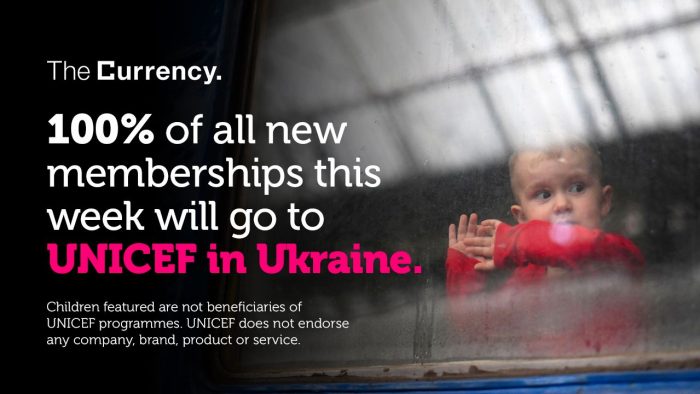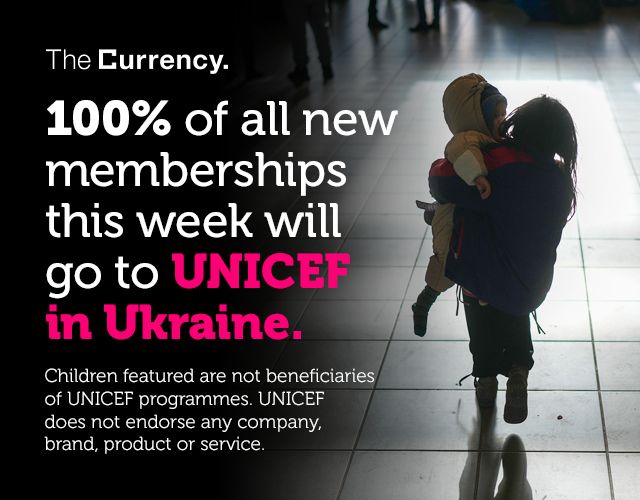Like everyone else, the team at The Currency has been horrified by the brutal and devastating invasion of Ukraine by Russia and has watched in pure admiration at the resolve, steel, and bravery of the Ukrainian people. Russia’s leaders are displaying the worst of humanity. The people of Ukraine are displaying the best.
And like so many people, we have been asking ourselves how we can help. So, after consulting with the team, we have decided to launch a fundraising effort for children and families in Ukraine.
We will be donating all income we receive from new members over the next seven days to UNICEF’s Ukraine Crisis Appeal.
Essentially, if you sign up in the next seven days, all the money will go straight to UNICEF. This includes all income we generate from monthly memberships and annual memberships.
Fifty new annual memberships would equate to a donation of €10,000 – and so on. We will absorb all additional costs such as Vat and transaction fees.
In addition, as a company, The Currency will be donating a further €10,000 to the UNICEF appeal.
At The Currency, we are upfront with our members. So, if you do become a member this week, be warned that unless you cancel your membership, it will automatically renew. However, we have made it simple and straightforward to cancel – it is just one or two clicks of a button. So, if you want to join to support the appeal but don’t want the membership renewing automatically, please make sure to cancel.
If you have any problems in this regard, just email [email protected] and we will look after it straight away. Likewise, we will be upfront about how much income comes in and how much our final donation is. Our appeal runs for the next seven days.

As a country, it is important that we show meaningful support to the people of Ukraine.
But it is equally important that we truly reflect upon Ireland’s role as a facilitator of Russian money over the past decade. Some professional services firms have now cut links with Russian special purpose vehicles registered in the IFSC. Others should do likewise.
Yesterday, we published an interview with Bill Browder, a lawyer and businessman who has spearheaded a campaign against Vladimir Putin and other Russian officials whom he blames for the death in 2009 of his lawyer Sergei Magnitsky in a Moscow prison.
From an Irish perspective, it made for depressing reading. For ten years, Browder tracked down flows of illicit Russian money; he worked with whistle-blowers, police sources and investigators. In the end, he traced millions back to Ireland. He gave his dossier to the Irish authorities in 2018.
“We visited the gardaí,” he told Rosanna. “We spoke to the head of the Economic Crimes Unit, and they took no interest, and the case was never opened.” The gardaí told The Currency they could not find evidence of illegality but declined to comment on the scale or scope of any investigation.
Browder has also campaigned here for a US-style “Magnitsky List” imposing sanctions on Russian officials. As the matter was being discussed by Irish parliamentarians in 2013, Russia threatened to block Irish adoptions of Russian children if they were implemented.
This was not just some informal threat. It was contained in a letter by Maxim Peshkov, a career diplomat who was the Russian ambassador to Ireland at the time. In the end, Ireland never implemented the Magnitsky Act proposal – Brendan Howlin once again called for its enactment in the Dáil last week.
Instead, we allowed more and more firms with strong Kremlin links to house money here. It is something that we have been looking into for a number of months now and something we will continue to do over the coming months. Essentially, when it comes to moving money around the world, Ireland has been a hub of choice for companies and individuals based in Russia.
You can access all of our coverage on Russian money in Ireland through this portal.
But to give a sense of what is going on, consider Sovcombank – the third-largest privately-owned financial institution in Russia by total assets, and Russia’s ninth-largest bank overall. It has just been added to the list of sanctioned Russian businesses. Washington listed 22 subsidiaries of Sovcombank subject to the asset freeze, all in Russia and Cyprus – none in Ireland.
However, picking through the details, Thomas discovered an Irish SPV, Sovcom Capital DAC, that is connected to it. Since October 2019, it has raised four successive tranches of $300 million, totalling $1.2 billion. Half of these bonds are issued in perpetuity and the rest have maturity dates in 2025 and 2030. It raised its latest bond just three months ago.
This is the latest example of what is going on here. We have previously reported on others such as Alfa Bank, VTB Bank and Rosneft.
It was something Stephen and Thomas discussed on our podcast last week, and something Stephen delved into in great detail in his column on Monday. If you missed it, here is a taste of what he said:
“We house billions of euros of Russian offshore wealth in the IFSC’s shadow banking system. Like it or not we are complicit in moving this money around the international financial system, but as it is that money is locked down for the moment. We will need to look again at a strategy of total financialisation under conditions where we house the money of deeply corrupt regimes like Putin’s.”
In the short term, it is important that businesses who can afford it provide meaningful support to Ukraine and its people. That is why we are making our own effort with this week’s campaign. In the longer term, we need to reform how we regulate money that is being flushed through Ireland and ensure that Ireland is not being used as a washing machine to clean dirty money.


